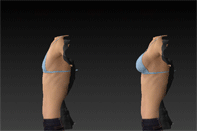By now you’ve probably read in the news or heard from a friend that injectable fillers can potentially cause blindness. Several news stories and a few medical journals have told the story of someone going to get fillers injected into their face and within a few hours they go blind. While these stories are well-documented, the chances of them happening are extremely rare.
99.99% of injectable filler procedures go off without a hitch. The patient is happy with the end result and the doctor chalks up yet another successful procedure.
So how and why do problems arise?
As with all plastic surgery procedures there is some risk involved. You could have an adverse allergic reaction, the doctor could not have his/her head in the proverbial game for that day (and wind up making a mistake), or any number of complications could happen.
Blindness happens when the injectable fillers get into blood vessels. The filler material is then transported to the eye nerve where it can cause blindness in 60-90 minutes if not treated immediately.
What to look for in a doctor?
If you visit a qualified, competent doctor, there should be a very minimal risk when you get your injectable fillers done. Problems, complications, and issues tend to arise with the so called “Groupon doctors”. Those doctors who offer a coupon code that takes the normal price of fillers and drops it drastically.
Good doctors with years of experience have no reason to go on Groupon or other coupon code websites and offer cut-rate services. They have built up a reputation over the years as being a competent doctor with an excellent track record. As such, they can command a fair market value for their services. They’re not hurting for business like the “coupon code doctors” are because they have spent years building up a great reputation among their clients.
When it comes to getting work done to your body, and considering as with all plastic surgery there is a very slight risk factor, do you really want to take your chances with the doctor in a clown suit who’s honking an over-sized horn while offering a Groupon discount?
Or would you feel safer with a competent doctor who’s had years of experience and performed tens of thousands of procedures?
What can be done to prevent issues from occurring?
Several medical journals have come up with a list of safety procedures when getting injectables. Here are just a few of the suggested practices for safely getting injectables done:
- Avoid using sharp needles in high risk areas. Instead use cannulas .
- Use smaller syringes, .5 to 1cc is recommended so that the plunger will require less pressure.
- Slowly, gently inject and do so in small portions.
- Inject to the correct plane and depth. This is why you need to find a doctor who has intimate knowledge of facial anatomy.
- Do you have a risk mitigation plan? If there is a complication it has been said that there is a 60-90 minute window to reverse the damage before you permanently go blind.
- Do you have an intimate knowledge of the anatomy of the human face?
There are several other suggested “best practices” laid out in that medical journal that any competent doctor will be aware of (and probably a few more).
You should also look for a doctor who has in-depth knowledge of the anatomy of the human face. Some doctors will even allow their assistants to perform the injections. While the assistant can be a resident doctor in training (and be perfectly safe to give you your injections), there is always a chance they are a non-medically trained employee. This is especially common in cut-rate doctors who offer discounts for fillers.
Some unqualified doctors may use fillers for purposes not intended nor approved by the FDA. While 99.99% of procedures may go off without a hitch, there’s always a chance that something can go wrong if the filler is not being used in the way it was authorized by the FDA.
To stay on the safe side, steer clear of cut-rate medical offices that offer discounted fillers.
Questions to ask your doctor
While the majority of filler procedures go off without a hitch, there is always the risk that a complication can happen. Here are a few questions you can ask your doctor so you can rest assured that you’re in good hands:
- Do you have a risk mitigation plan? If there is a complication it has been said that there is a 60-90 minute window to reverse the damage before you permanently go blind.
- Do you use blunt tip cannulas?
- How will you inject the fillers into my face? (it should be slow, deliberate and in small portions)
- Do you have an intimate knowledge of the anatomy of the human face?
All qualified doctors will be able to answer those questions with the greatest of ease. Generally speaking, answers might differ slightly from doctor to doctor, but overall they should have a mitigation plan in place, they should be aware of the risks involved and will be able to clearly explain to you those risks and how the practices they use mitigate the chances of any complications.
Follow Up Questions
If you still have questions about injectable fillers or the safety of them, give us a call at (214) 965-9885 or email us for more info. Dr. Adams is a board qualified surgeon with years of experience. Dr. Adams also offers a virtual consultation for patients who reside out of town, and would like an opinion prior to traveling to Texas.
The Park Cities Surgery Center where Dr. Adams works is conveniently located within 15 minutes of Love Field Airport and 30 minutes from Dallas Fort-Worth airport.

















